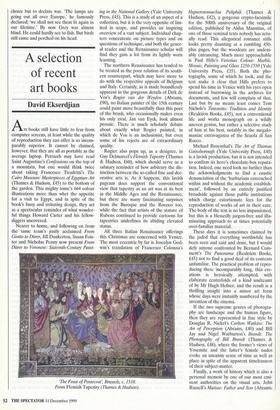Odd birds of a feather
Jane Ridley THE COTTAGE BOOK: THE UNDISCOVERED COUNTRY DIARY OF AN EDWARDIAN STATESMAN by Sir Edward and Lady Grey Gollancz, f18.99, pp. 176 This is a book that can't decide what it's about. The publishers want to market it as a successor to the hugely successful Diary of an Edwardian Country Lady. It's decorat- ed with rather twee watercolours which make it look like one of those countryish books you buy in aid of one-legged jockeys. In spite of the packaging, though, it's a serious natural history record and an intriguing story.
Edward Grey, the foreign secretary who led Britain into the first world war, was a very odd bird indeed. A dedicated country- man and liberal MP, he owned an estate at Falloden in Northumberland whiCh was too far from London to reach at weekends, so he and his wife Dorothy built a tin cottage near Winchester on the river Itchen. On Saturday mornings in summer Grey would catch the 6 a.m. from Waterloo and travel down to Hampshire, walking across the fields to the cottage in time for a day's fish- ing.
Grey wrote the classic Fly Fishing (1898) during these years, but The Cottage Book isn't about fishing. It's a log of birds and nests and birdsong compiled jointly by him and Dorothy. Grey was the more fluent writer, and he contributed most of the entries, but Dorothy was the more passion- ate naturalist. She wrote beautifully too. A strange creature, she was intensely shy but magnetic. She loved being alone and there were days when the only words she uttered were (to the housekeeper), 'Dinner at half past five, please, Susan.' Her entries in the book show whole days spent haunting the woods, listening for nightingales or wrens, or searching the hedgerows for impaled corpses left as the grisly larder of the red- backed shrike. On hot summer nights they slept out, and Dorothy lay listening. 'I got the little breeze that says "the dawn — the dawn," and dies away.' They didn't go to church, but read Wordsworth's Prelude on Sundays. One day at breakfast they heard a wren singing, and Dorothy thought
how nice it was that we knew enough to be able to love it so much, and how many peo- ple there were who would not be aware of it, and E said, 'Fancy if God came in and said, "did you notice my wren?" and they were obliged to say they did not know it was there.'
The cottage was sacred, an intensely pri- vate world where they could escape from London society, which Dorothy hated, and the drudgery of office, which Grey resented (he was under secretary at the Foreign Office).
The Greys had no children; it was well known, Michael Waterhouse writes in his excellent introduction, that theirs was un manage blanc. There was something child- like about Dorothy's innocence, her love of nature and solitude. The idyll had a darker side, though. When Dorothy suggested normal physical marriage, Grey refused. He told her they were happy as they were, but it's likely, as Waterhouse suggests, that he was involved with another woman Pamela Tennant, whom he later married as his second wife. Her son, Christopher Grey Tennant (born 1898), may have been Grey's. To preserve the peace of his beloved Dorothy he deceived her. Edwar- dian innocence — that Peter Pan Never Land of not saying — was bought at high cost.
Dorothy was thrown from a dogcart and killed in 1906. She was only 41. Grey flung himself into his work as foreign secretary, an office that he held for 11 years. Just as he had deceived Dorothy, he now misled his country, gently leading it to Armaged- don by entering into secret military under- takings to France which meant that when Germany invaded Belgium Britain had no choice but to declare war. The lamps are going out all over Europe,' he famously declared; 'we shall not see them lit again in our lifetime.' By now Grey was almost blind. He could hardly see to fish. But birds still came and perched on his head.



























































































 Previous page
Previous page